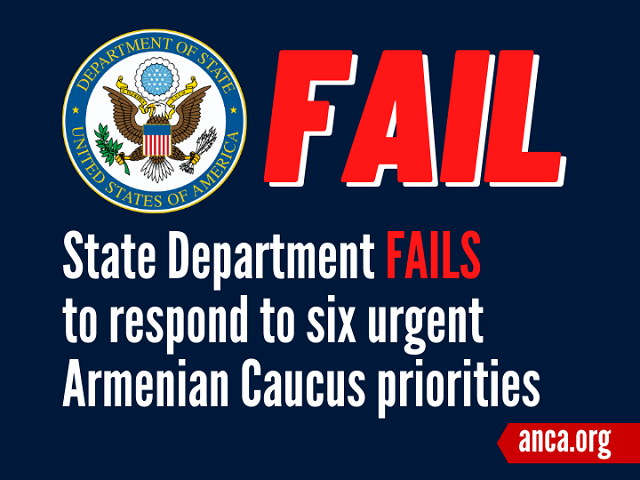Administration Letter Unresponsive to Six Bipartisan Congressional Policy Priorities
WASHINGTON, DC – The State Department’s response to a detailed Armenian Caucus letter was unresponsive to six specific policy priorities raised by over 100 Congressional signatories – failing to address or even mention the plight of over 200 Armenian prisoners of war still being held, abused, and killed by the government of Azerbaijan, reported the Armenian National Committee of America (ANCA).
The May 6, 2021 State Department letter, signed by Naz Durakoglu, Acting Assistant Secretary of State for Legislative Affairs, came in response to a February 19, 2021 Armenian Caucus letter outlining a broad range of bipartisan policy concerns. In the months since the Caucus sent this letter in February, it has forwarded two additional Congressional letters to the Biden Administration, the first calling for Armenian Genocide recognition and the second seeking a robust aid package of at least $100,000,000 for Artsakh and Armenia.
Armenian American community members and coalition partners can call for sanctions on Azerbaijan by visiting www.anca.org/907 and support robust U.S. aid to Artsakh and Armenia by visiting www.anca.org/aid.
Read also
The six policy priorities left unaddressed by the Administration’s letter are listed below.
1) Prisoners of War: The bipartisan Armenian Caucus letter stressed that Azerbaijan has refused to free Armenian prisoners of war and apprehended civilians.
The State Department entirely ignores Congressional concern for the release of Armenian prisoners of war, failing, in this letter, to even cite their existence, despite sustained Congressional pressure.
2) Azerbaijani and Turkish Aggression: The bipartisan Armenian Caucus letter identified Azerbaijani and Turkish forces as having initiated the September 27, 2020 attack that killed an estimated 5,000 people and forced more than 100,000 ethnic Armenians to flee from Artsakh.
The State Department fails to identify Baku and Ankara as aggressors, choosing instead to speak generically of “last year’s fighting.”
3) U.S. Humanitarian Aid: The bipartisan Armenian Caucus letter called for “significant U.S. commitments” of urgently needed humanitarian aid for the people of Artsakh, to help them reconstruct their communities and rebuild their lives. (A subsequent Armenian Caucus letter called for at least $100 million in U.S. aid.)
The State Department dismisses Congressional calls for a significant U.S. commitment, citing just $5 million in humanitarian aid it has sent to support affected populations of both Armenians and Azerbaijanis.
4) Section 907: The bipartisan Armenian Caucus letter supported ending the waiver of Section 907 of the FREEDOM Support Act, sanctioning Turkish and Azerbaijani leaders, and ceasing military aid to Azerbaijan through the Section 333 Building Partner Capacity program.
The State Department neglects to mention that the White House officially waived Section 907 of the FREEDOM Support Act, and fails to respond to Congressional concerns about withholding U.S. aid to Baku.
5) Turkish Drones and Prohibited Munitions: The bipartisan Armenian Caucus letter cited Azerbaijan’s use of Turkish Bayraktar drones utilizing American components and technology, and also Baku’s illegal use of cluster and white phosphorus munitions.
The State Department disregards Congressional concern over Azerbaijan’s illegal use of cluster and white phosphorus munitions, and fails to address Baku’s deployment of Turkish Bayraktar drones utilizing American components and technology.
6) Foreign Mercenaries: The bipartisan Armenian Caucus letter cited Azerbaijan’s deployment of Turkish-backed foreign mercenaries, many with ties to internationally recognized terrorist groups.
The State Department refuses to address Congressional concerns about the foreign mercenaries recruited by Turkey to fight alongside Azerbaijani forces.
> The February 19, 2021, Armenian Caucus Letter is available here.
Armenian National Committee of America
Photo Caption: The ANCA identifies 6 key areas where the State Department’s response to Armenian Caucus policy priorities falls short.























































